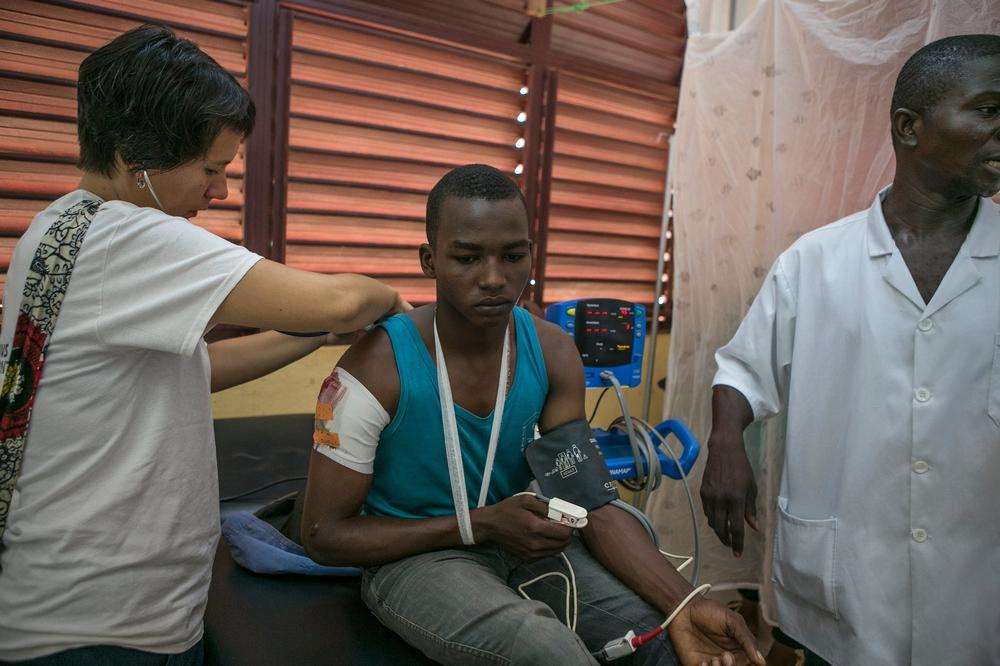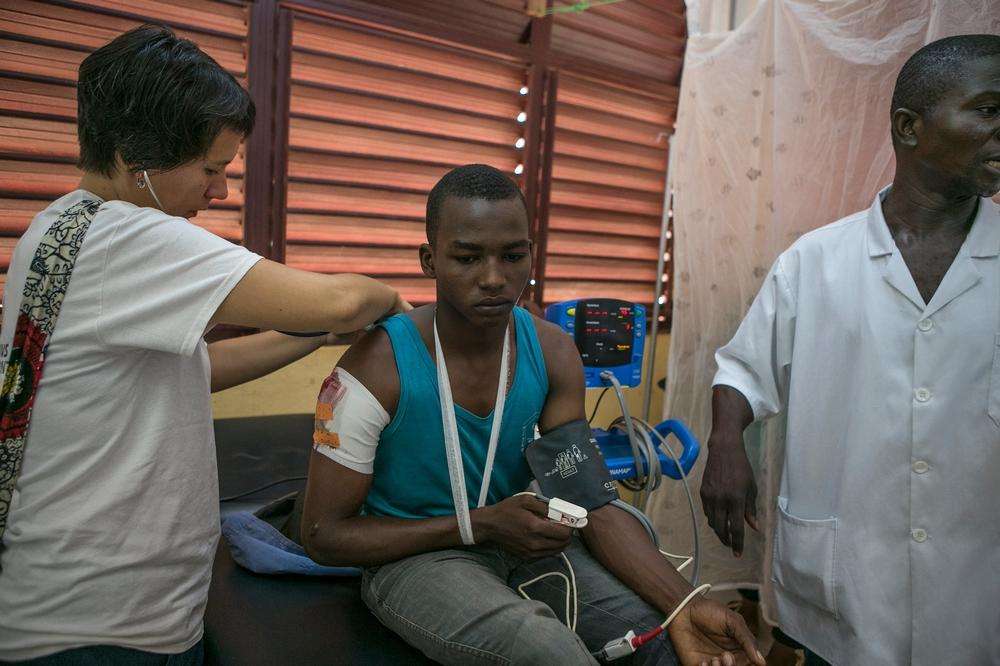Thierry Dumont, Doctors Without Borders/Médecins Sans Frontières (MSF) head of mission in Central African Republic (CAR), describes the current humanitarian crises in the country.
What is the humanitarian situation in CAR today?
The humanitarian situation is still critical. One and a half million people are food insecure according to the United Nations Office for the Coordination of Humanitarian Affairs (UNOCHA). The public health system is highly insufficient, and international NGOs have, with few exceptions, no choice but to substitute for it. Most health facilities were already in poor condition in 2012 and are now nonfunctional. Medical personnel are not skilled enough because of the difficulty of obtaining medical training, and many are not performing their duties due to widespread insecurity, especially in the provinces. The supply of medical material remains very difficult to maintain.
NGOs will never have the means to cover all of CAR’s health needs. Only a state can play this role. In the absence of free public health services, health care and quality medicines will remain an inaccessible luxury for the vast majority of inhabitants.
The health needs are currently immense: the HIV prevalence rate is the highest in Central Africa, malaria is endemic and the leading cause of death among children under 5, and only 13 percent of children below one year old have received the recommended vaccines. The mental health needs are also very significant, with people traumatized by the violence, atrocities, and permanent insecurity that they have suffered for more than three years.
The recent violence on September 26 resulted in 44,000 newly displaced people in Bangui. According to UNOCHA, there are now 447,487 displaced people in CAR and 456,714 refugees in neighboring countries. Today, 20 percent of the Central African population are internally displaced or refugees in neighboring countries.
What are the humanitarian consequences of the violence in Bangui, CAR's capital?
Following the outbreak of violence in December 2013, more than 500,000 people, or 70 percent of the people of Bangui, were displaced according to UNOCHA, having fled mainly to displacement camps. The situation then improved, with families gradually returning home.
But on September 26, 2015, the violence triggered by the killing of a Muslim motorcycle taxi driver has again significantly affected the population. Almost 100 people have died, 512 injured have been treated in the hospital structures in the city (including 298 by MSF), and 44,000 have again fled their homes.
MSF teams have treated wounded people in three health structures where teams conduct regular activities: Bangui General Hospital, Castor Maternity Hospital, and the Mpoko internally displaced persons (IDP) camp. In total, MSF treated nearly 300 injured in the three health facilities from September 26 to October 6, including 183 in Bangui General Hospital. Eight hundred fifty surgical operations were performed in the same hospital from September 1 to October 30. However, patients are often unable to reach MSF’s facilities, and MSF teams are unable to reach people in need, because of the threat of violence. People who need urgent medical care, such as women in labor, are often blocked from accessing it. At MSF’s Castor Maternity Hospital, for example, the number of patients decreased from 30 per day to zero for almost a week because of violence in the city, and we can only imagine the consequences.
The people who have been displaced are living in makeshift camps with few belongings, and in great need of shelter, food, and medical care. MSF is running mobile clinics in five internally displaced persons (IDP) sites. With more than 1,000 consultations a week, mainly for malaria and respiratory infections, these mobile clinics allow people to have free quality care despite a volatile and unpredictable security environment.
Special attention has been given to pediatric care. Thus, MSF has conducted a vaccination campaign against measles for children aged 6 months to 10 years in 12 priority sites. Among these are the IDP camps and the Central Mosque of the PK5 District, where MSF runs a mobile clinic once a week. MSF also supports pediatric care at the Mamadou Mbaïki health center in PK5.
The recent violence in Bangui has also affected other regions. Safety is not assured on the roads, which is paralyzing an already devastated economy and posing problems of supply in essential goods, food and humanitarian aid. This has implications for the deployment of aid, with convoys regularly targeted in attacks. Several MSF cargo shipments have been stranded in Cameroon. Some areas are not accessible by road, forcing us to use very expensive flights to supply material to our projects.
Movements to and from health facilities are dangerous. Ambulances have been attacked and medical personnel have been threatened.
What are MSF's activities in Central African Republic?
MSF has been working in CAR since 1996. Despite insecurity and regular violence, MSF is maintaining its presence in CAR. In addition to several projects in the capital Bangui, we work in 15 localities. MSF also works with CAR refugees in Cameroon and DRC.
MSF’s volume of operations has continued to increase for several years, with 15 projects across the country such as hospitals, interventions in public structures, maternity centers, mobile clinics, vaccination campaigns, and HIV care. MSF’s programs in CAR are the third-largest in the world, with more than 2,000 national staff and more than 200 international staff.
MSF continues emergency surgery and trauma care for adults (3,276 surgeries were performed between January and September 2015 in Bangui General Hospital) and support for victims of sexual violence (556 victims of sexual violence was supported from January to September 2015).
MSF also continues its assistance for the displaced, particularly in the Mpoko camp and in the Muslim enclaves of Carnot, PK5, and Bambari. Following the violence in September 2015 in Bangui, MSF has increased its support for displaced people and set up mobile clinics for new IDPs in seven new sites in the city, including BenZvi, Saint-Sauveur, John XXIII, FATEB, Bethanie and St-Jacques of Kpétènè.
Throughout the year, MSF has also continued its regular programs focused on malaria, HIV, tuberculosis, immunization and maternal and child health (more than 15,000 deliveries were performed from January to September 2015).
Learn More About MSF's Work in CAR





